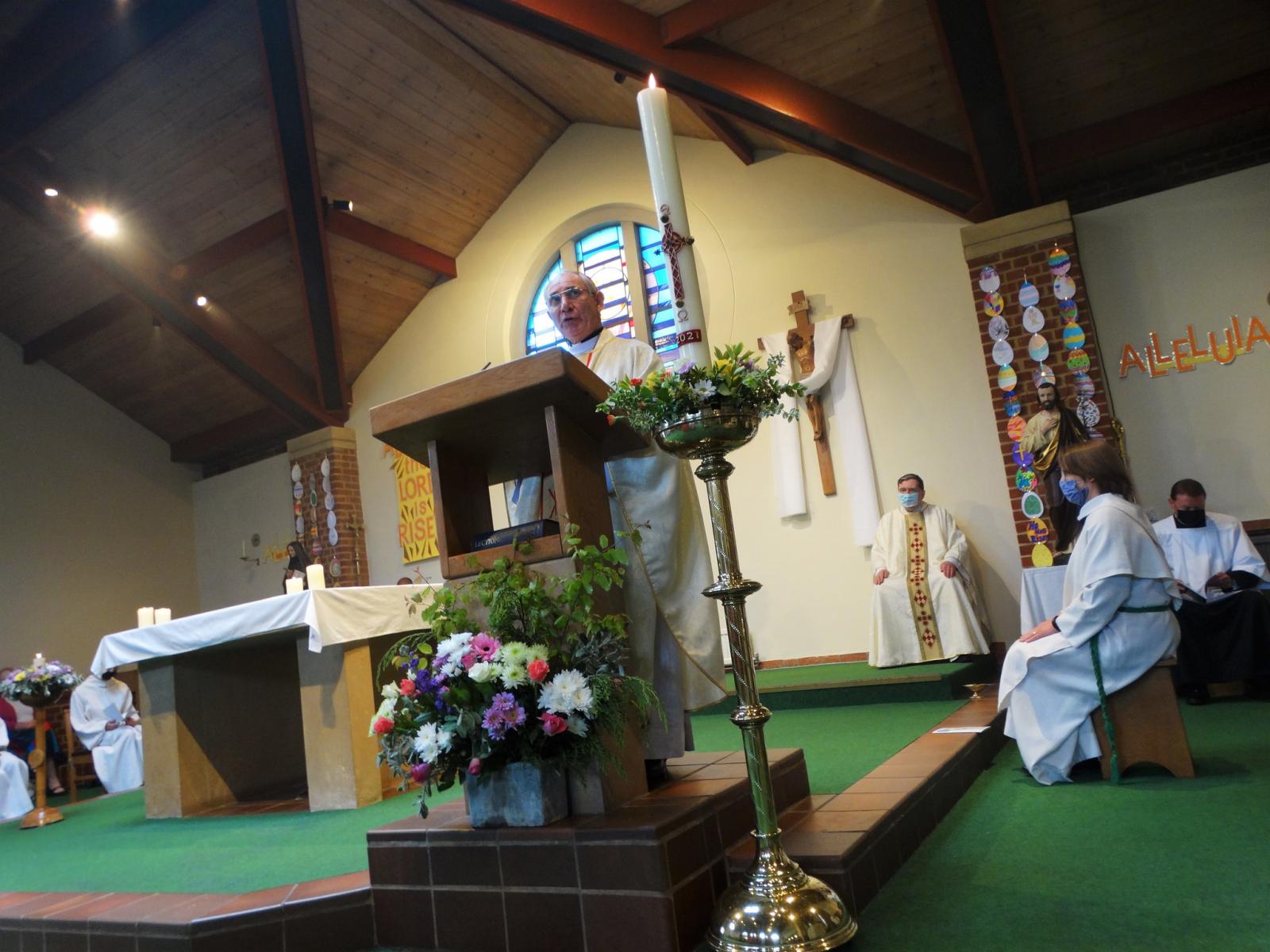This homily was delivered by Bishop Paul McAleenan at the annual Mass for Migrants on 1st May 2021. The Mass was celebrated at St William of York Church, Forest Hill, in the Archdiocese of Southwark.
When the annual Mass for Migrants began several years ago, it was subtitled: ‘To celebrate the contribution of Migrants to the Church and Society’. The Mass recognised not only the presence but also the value of those from overseas who had made their home here.
Now in 2021, following a year when we walked through the unknown, those same words, ‘The contribution of Migrants’, take on a much deeper and profound meaning.
The contribution of migrants is not seen as something minor, providing what may make life more comfortable; now it is seen to be vital and essential. In hospitals, in care homes, in transport and in many occupations and professions, migrants were indeed key and frontline workers.
It is sobering to think that those with overseas origins figured prominently among the casualties of coronavirus, often in the course of their work, and migrant communities were among those who suffered most. As we recognise the contribution of migrants, we acknowledge their sacrifice. We must avoid though the assumption that those who have made their home here occupy necessary but lowly positions. In education, in medicine, in technology, in politics, migrant communities provide leaders, specialists, experts and professionals and increasingly so. Pope Francis uses four verbs to indicate how this vital involvement of migrants in our communities will continue for their and everyone’s benefit: welcome, protect, promote and integrate.
It is well known how our parishes have been rejuvenated by the presence of those from overseas. Churches where congregations had grown smaller were given new life, vibrant liturgies resounded in churches which had grown quiet. It is hoped that those new congregations found a welcome. It is hoped that they felt protected. Though to welcome and protect is not sufficient, it is indispensable but not enough, in the Church or in society.
True acknowledgement and acceptance must include promotion, a way of relating and interacting that encourages development of potential and ability, that integration may be achieved.
As we edge out of the coronavirus crisis, it may seem that we are reaching an open highway. In fact, we are at a crossroads, an opportunity to reflect on experience, to learn some lessons, to ask how best to advance the wellbeing of all humanity.
In his letter to the whole world, Laudato Si', Pope Francis speaks of three principles of which to be conscious. He was speaking in terms of the environment, of our common home, Mother Earth. These same principles form our thinking as we prepare for a post-COVID world.
Pope Francis said, ‘Everything is gift’, and indeed the past year has demonstrated that life and health are gifts, we are gifts to each other, our faith is a gift, migrants are a gift and were seen to be so. Gifts need to be protected, not misused or discarded.
‘Everything is fragile’, which we also saw; health can easily be lost. Eco systems are fragile, as Pope Francis reminds us, they can be disrupted and destroyed. Our lifestyle matters. The way of living in wealthy industrialised nations has a direct effect on those thousands of miles away, causing migration through climate change.
Many people do not want to leave their own country; they have a right to remain where they were born if they wish. There are times when a search for a better life is forced upon them, because as Pope Francis says, ‘Everything is connected’. There is an interdependence which extends into so many areas we never dreamt of.
We truly are our brothers’ and sisters’ keeper. Therefore, the Church is obliged to pursue those means which will achieve justice, equality and honour the dignity of all, whether they live in our midst or elsewhere.
The debate around immigration and migrants continues. Future plans include categorising migrants, dividing them into different groups. The result would be some being seen as more worthy than others, depending on how they enter the country.
The world has already much division, between nations, between races, between indigenous populations and migrants. Further attempts to introduce what is divisive, in a way that undermines, needs to be opposed by the Church and all people.
As a Church we see the differences between nations and cultures as sources of mutual enrichment. One’s culture is to be treasured and shared that others can rejoice.
Today, here in this Church, on the feast of St Joseph, patron and protector of the Church, and at every Mass for Migrants, we witness the tapestry and the beauty of the worldwide Catholic Church and celebrate it. It is hoped that soon we will do so again in an overflowing cathedral as we did before.
In the meantime, and at all times, honouring and upholding the dignity of all our brothers and sisters is an essential element of our faith. This is especially true when those brothers and sisters are also known as ‘migrants and refugees’.
Photos from the Mass for Migrants are available here.
Image: Archdiocese of Southwark
